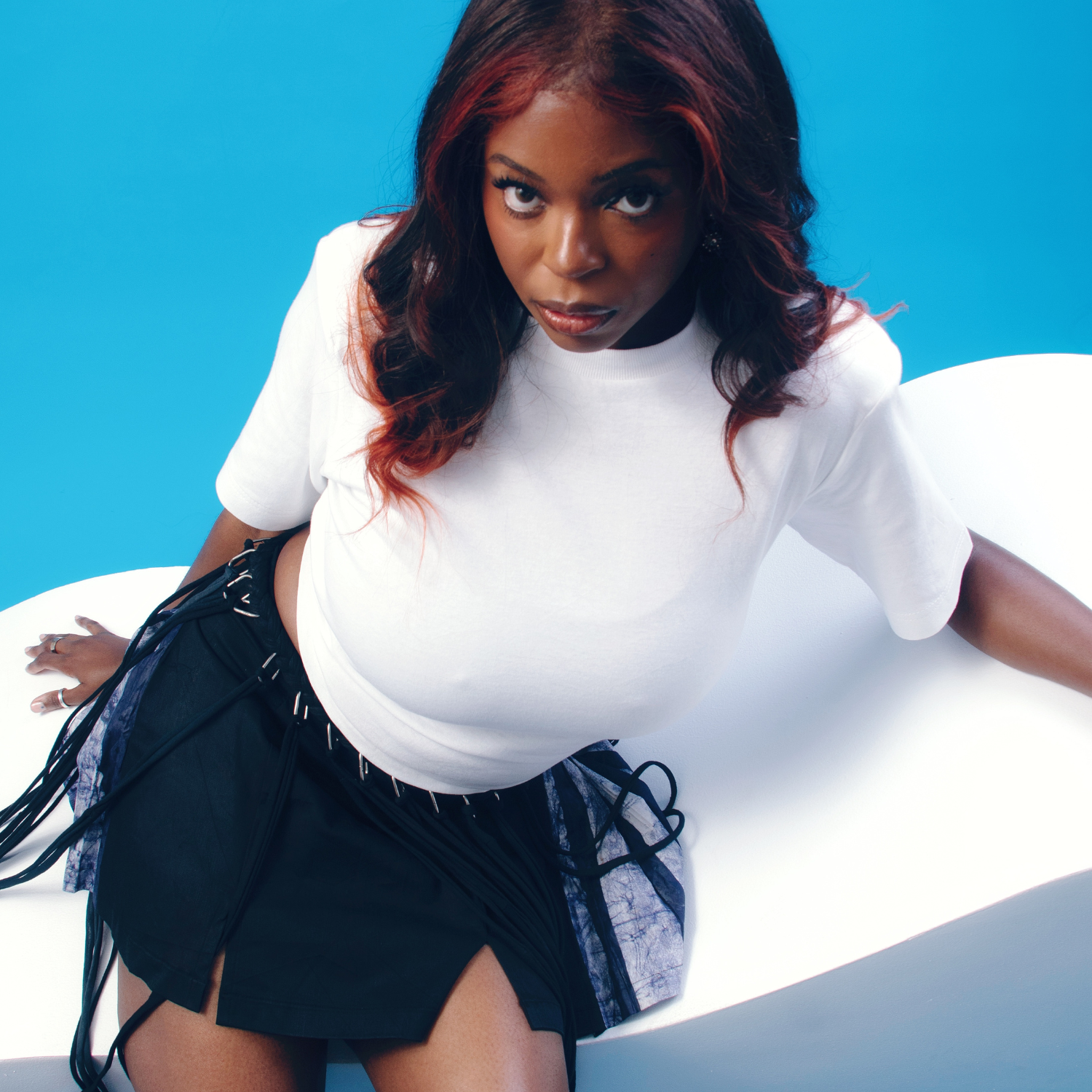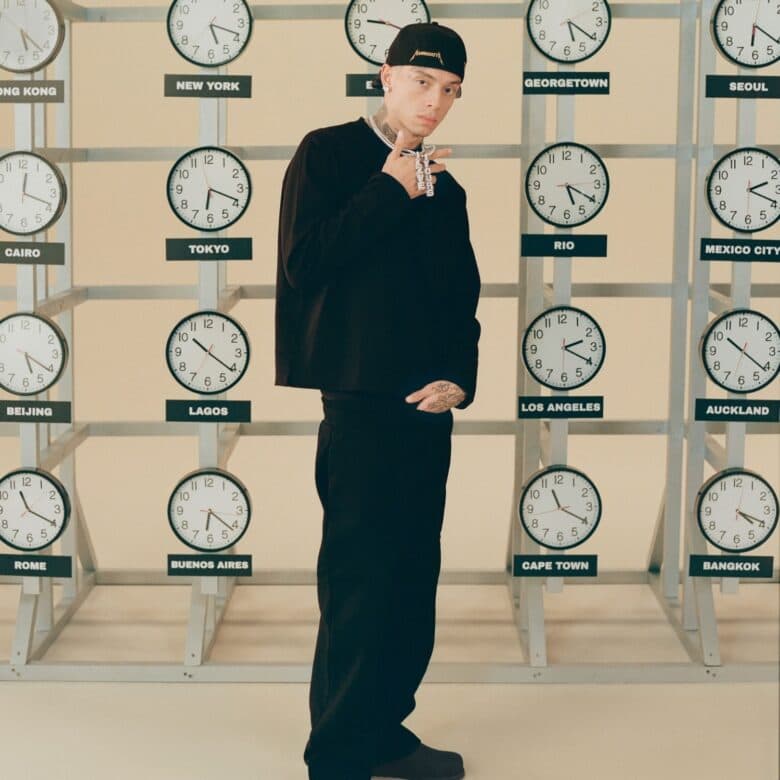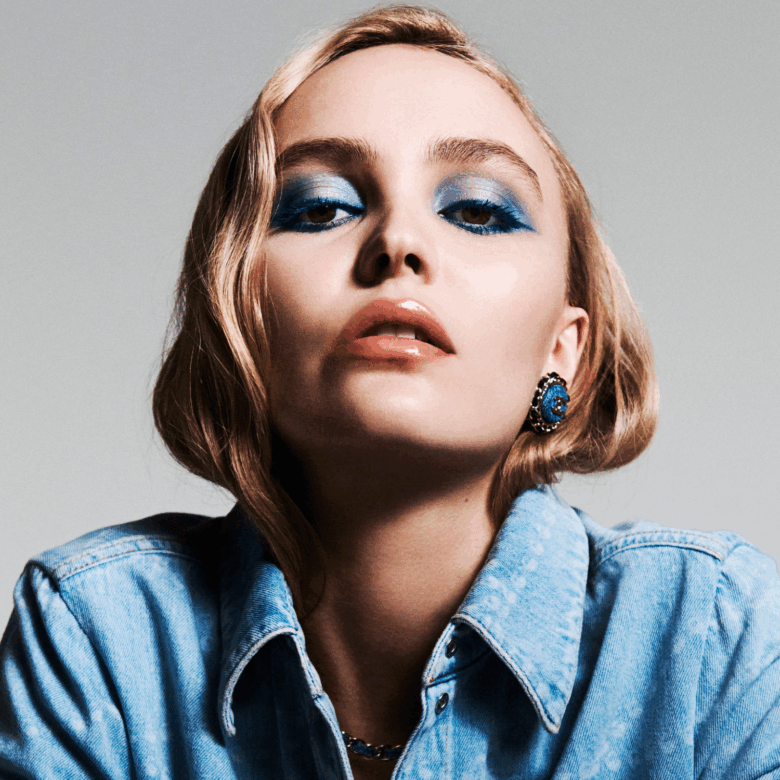I meet Kah-Lo in the middle of the lobby bar at One Hundred, Shoreditch. As we hug hello, I can feel the pop/house singer scanning the room over my shoulder, taking note of the increasingly tipsy group of colleagues behind us. We quickly move to a table in the corner. “Is it going to be too noisy?” she asks, a little on edge about whether I’ll be able to record our conversation. The phone between us suddenly seems awkward. Kah-Lo fidgets in her seat, crossing her legs, her long nails tapping the glass of her Negroni.
The person sitting opposite me, it turns out, is an interview pro. Kah-Lo, most widely known for her single “Fake ID” (the song was used to launch TikTok back in 2017), originally trained as a journalist before becoming the Grammy-nominated house artist that she is today. The Nigerian singer admits that it took her a while to stop asking questions and surrender to being the subject. But I wonder if, like all people who are skilled in the art of (soft) interrogation, she is actually a little shy. Or, perhaps, guarded towards an industry that has not always treated her favourably. “I’m trying to be a lot more open,” she says. “Historically, I’ve been uncomfortable sharing aspects of my personal life. I’m a yapper, but I’m pretty private.” And it’s true. Though this interview supposedly marks a shift in Kah-Lo’s media approach, I still come away not knowing her age or the name of her husband.
The artist’s career took off after the 2016 release of “Rinse and Repeat” — a collaboration with electronic producer Riton, whom she connected with on Twitter and has since written numerous hits with, including “Ginger” and “Back to You” (also co-created with Selena Gomez), which have amassed over 138 million streams on Spotify. But before this, Kah-Lo was releasing music under her real name, Faridah, working as a featuring vocalist. The singer admits she fell into house music because, she tells me laughing, “I can’t help having an epic voice”.
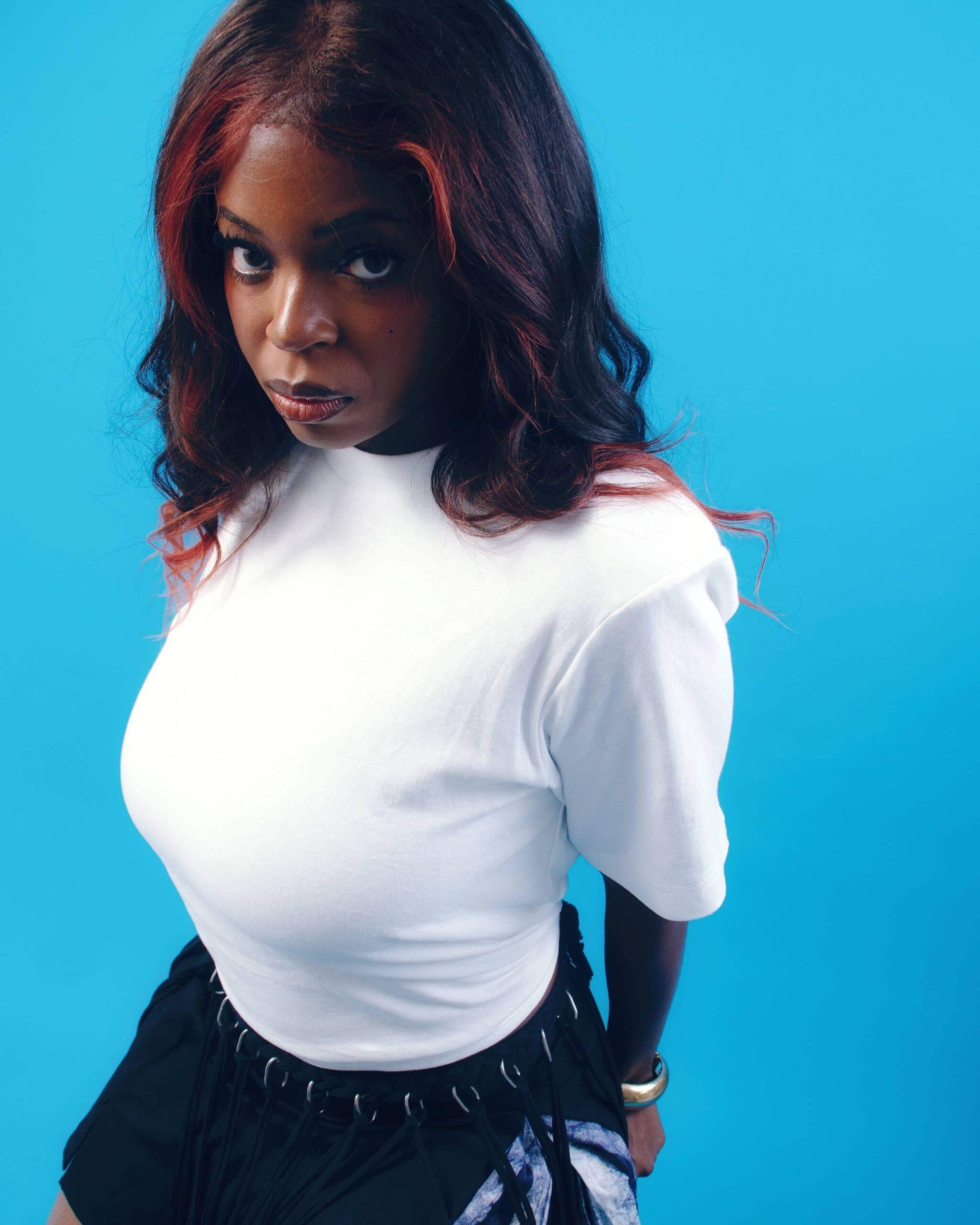
In 2023, Kah-Lo wrote a personal essay for Billboard, sharing the difficulties she’s experienced as a Nigerian artist in the industry. It’s a rare glimpse into her personal life and feelings. It’s impressively difficult for someone who regularly posts TikToks documenting their day-to-day, but perhaps made permissible by her ability to control her own voice. It’s a privilege that many would take for granted had their contributions to music not always been credited. Throughout her early career, Kah-Lo tells me that people were “cutting my name out of things, not paying me what I was worth (or at all) and then if I spoke up, it [was] kind of like, Oh you’re being difficult.”
To stand up for herself, the singer would pre-write speeches in her Notes app, “hands trembling” as she delivered them. But now she is more intuitive and authoritative in her approach to work. “I journal and see if it feels right in my body,” Kah-Lo says. “If it’s making me squirm when I hear it, I don’t want to do it.”
Conversation turns to a different form of expression: fashion. I ask about the green wig she sported in Ibiza in 2018, so different from her satin navy trousers and loafers look today. A persona, a “trauma response”, a “Hannah Montana situation,” she laughs. “I was in tech at the time, and people weren’t taking [my music] seriously. I was like, Okay, I think I need to just shed skin and become this whole other person.” It was from this point, only when her hair was too striking to ignore, that people finally recognised her as an artist in her own right.
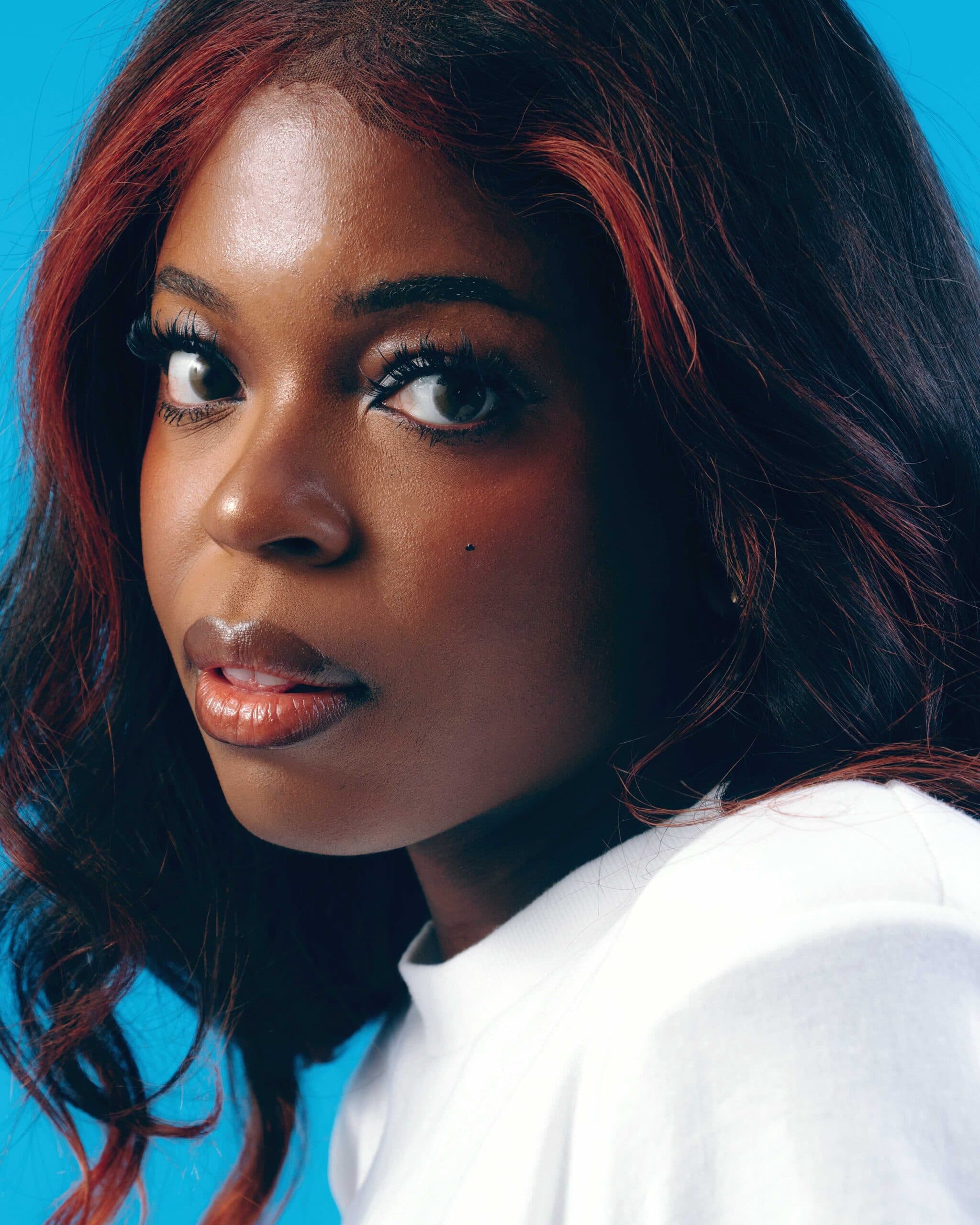
The coloured-wig-to-loafers pipeline is evidence of Kah-Lo’s next reinvention. We’ve met today to speak about her new single, “Somersaults”, a dynamic track that’s part of her upcoming project coming out next year. It signals a different chapter in her life brought about by eight months of intense grief and change. In 2022, her dad died, she broke up with her boyfriend, and then relocated back to Nigeria, leaving behind a life in New York City that she loved — which, she tells me, was actually “more sad to break up with than” the guy. And then, she reconnected with her high school prom date, now husband, who she married in 2024, and admits to always knowing was really ‘the one’. “No offence to my exes”, she laughs.
The album, a mixture of love, loss and grief, combines more lyrical tracks with the artist’s signature “club bangers” — because “sometimes you cry in the club”, too. For it, Kah-Lo took inspiration from her dad’s taste in music, listening to Shalimar, the Whispers, George Benson and Michael Jackson whilst writing. The result? An original disco-esque dance tune that blends pain with joy to produce an emotionally complex and interesting sound.
With this new music, Kah-Lo carves out space for herself as a Black alternative artist. It is an identity, she tells me, challenging to obtain for many others, like “Rachel Chinouriri, who makes alternative rock-type music, but the mainstream community would call R&B.” For the “Fake ID” singer, existing within this category, and being acknowledged for it, feels like a long time coming. Her work was incorrectly labelled as Afro House for years. “When ‘Rinse & Repeat’ came out, people didn’t know where to put it because I sounded African. I’m speaking English, but I,” Kah-Lo drags out the syllable, “sounded African. Anything I touched would be labelled ‘Afro’-something because of my accent alone.”
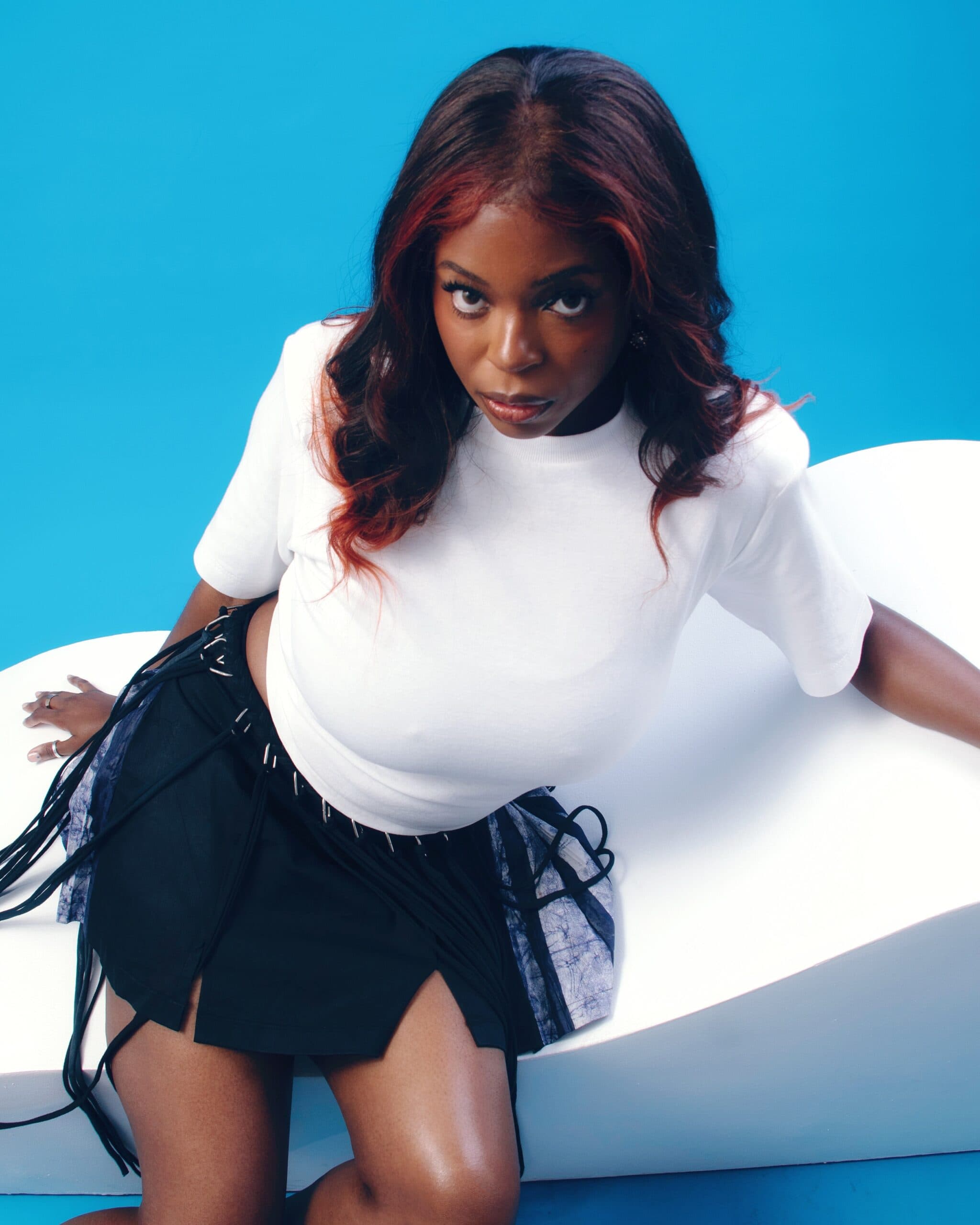
It’s a tag that makes her a “little peeved”. Kah-Lo is tentative at first when I dig further for how this makes her feel. But the artist, finally opening up — Notes app no longer needed, green wig set aside — instead shares her previous lack of knowledge of house history. When she was younger, Kah-Lo “didn’t know any iconic black house artists”. The first people she listened to were Basement Jaxx and Groove Amada. So, she “thought house was kind of like white music.” Those were the DJs the artist “consumed on MTV growing up”. “It wasn’t until I started making it,” she adds, “that I realised, Oh shit, it started in Chicago with Black artists making things.”
Kah-Lo also explains how Afrohouse is rising in popularity and entering the mainstream because of European DJs sampling tracks in their sets. “It breaks my heart,” she says to see the “DJs [who] have been making insane music on the same level, if not better, since my career [being] surpassed by a couple of white Germans.” “Who knows?” Kah-Lo says dryly, “They might eventually just call it house and take out the Afro.” For the artist, who has been repeatedly approached to make Afrohouse music throughout her career, the conditions around her possible contributions are clear: “I want it to be somebody Black and preferably somebody African.”
When the interview is over, Kah-Lo picks up her ice-cube-diluted Negroni, abandoned during our conversation. I ask about her stylist, how she finds London, the usual — but, instead, we ease into a discussion around her skills as a seamstress. “I took three years of sewing classes,” she tells me. I confess to finding the activity nothing less than rage-inducing. “Oh yes, it will make you angry,” she laughs, miming out how “threading the machine can make you throw a whole fit sometimes”. The thing is, she postulates, “My goal is to die empty. I just want to pour out every creative bone. I can’t hide behind drunk anthems anymore, I want to speak to how people feel.” Then, she beams, adding cheekily: “Who knows, you might see a clothing line from me soon? So maybe I won’t attack my machine.”
- WriterHattie Birchinall
